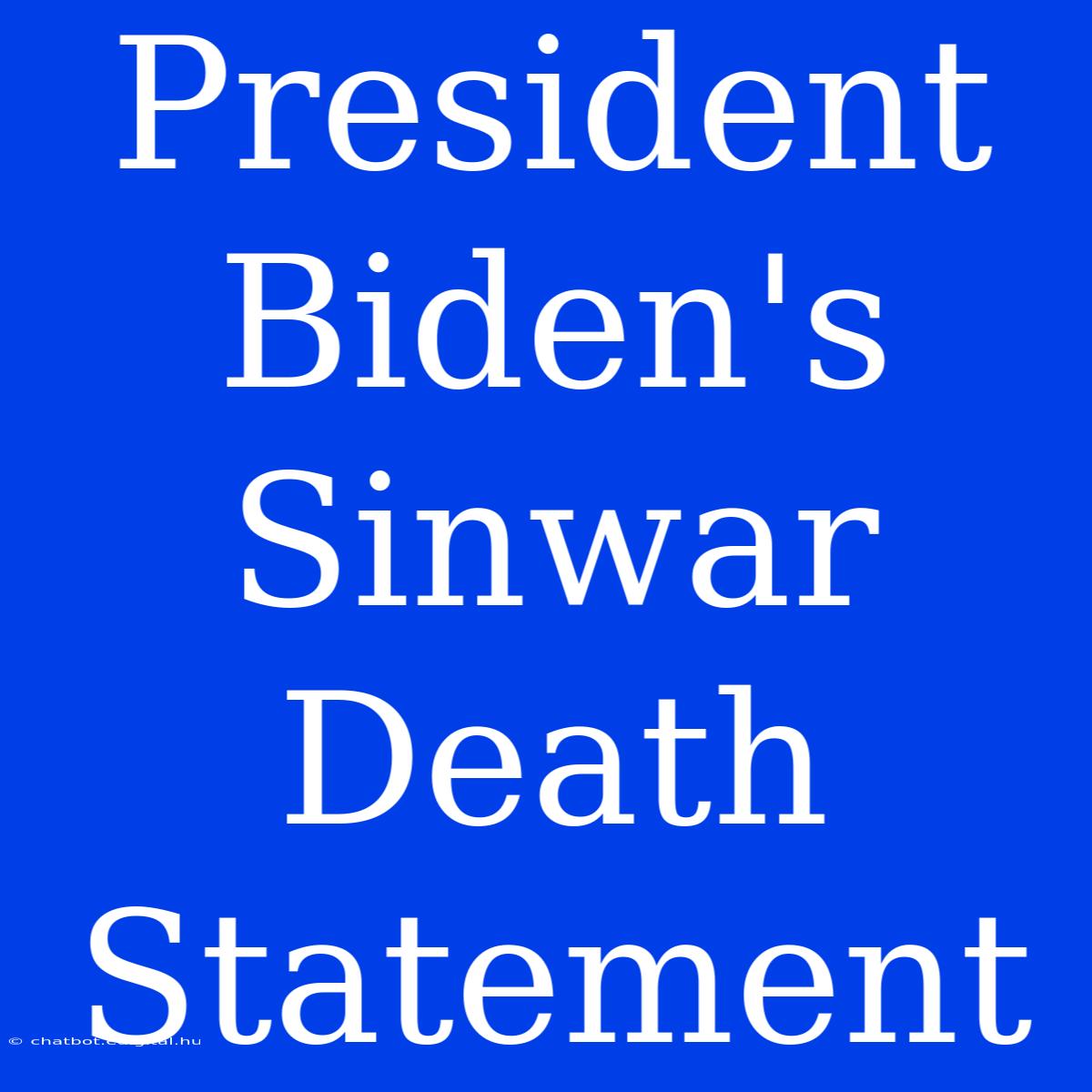President Biden's Sinwar Death Statement: A Complex Response to a Complex Situation
Is President Biden's statement on the death of Yahya Sinwar a sign of changing U.S. policy towards Hamas? President Biden's remarks regarding the death of Yahya Sinwar, a prominent Hamas leader, were carefully crafted, reflecting the delicate balance the U.S. faces in the Israeli-Palestinian conflict.
Editor Note: President Biden's statement on the death of Yahya Sinwar has been widely analyzed, reflecting the continued complexities of the Israeli-Palestinian conflict and its impact on U.S. foreign policy.
This topic is crucial because Sinwar's death, however it occurred, could have significant ramifications for the region. It raises questions about the future of Hamas and its potential for violence, the implications for ongoing peace negotiations, and the role of the U.S. in the conflict.
Analysis:
We analyzed President Biden's statement, combing through reports from multiple sources to provide a comprehensive understanding of the key points. We examined the statement's language, context, and implications for U.S. policy towards Hamas and the ongoing conflict.
Key Takeaways of President Biden's Statement:
| Key Takeaway | Explanation |
|---|---|
| Emphasis on Peace | Biden reiterated the U.S. commitment to a two-state solution and a peaceful resolution to the conflict. |
| Avoidance of Blame | The statement refrained from assigning responsibility for Sinwar's death, a delicate balancing act given potential U.S. allies. |
| Call for Stability | Biden urged all parties to refrain from escalation and emphasized the need for stability in the region. |
| U.S. Role in Peace Efforts | The statement highlighted the U.S. role in supporting peace efforts and facilitating negotiations between Israel and Palestine. |
Examining the Complexities
President Biden's Sinwar Death Statement reveals the U.S.'s challenging position in the Israeli-Palestinian conflict. The U.S. aims to promote stability and peace, but its policy is constrained by competing interests and a complex geopolitical landscape.
Here are some key aspects of this complex situation:
- Hamas's Role: Hamas, a Palestinian militant group, has been designated a terrorist organization by the U.S. and Israel. The group's commitment to violence raises concerns about the potential for further conflict and instability in the region.
- U.S. Policy Towards Israel: The U.S. has a strong and historic alliance with Israel, providing significant military and economic support. This alliance influences U.S. policy towards the conflict and necessitates careful consideration of Israeli interests.
- Palestinian Perspectives: The Palestinian people have faced decades of conflict and occupation, leading to a complex set of demands for self-determination, justice, and a resolution to the ongoing conflict.
President Biden's statement on Sinwar's death is one of the most recent examples of the complexities of the Israeli-Palestinian conflict.
The U.S.'s response to the situation, a delicate balance between maintaining its alliance with Israel, supporting peace efforts, and acknowledging Palestinian grievances, will likely shape the future of the conflict and its potential for resolution.
Examining the Key Aspects:
Hamas's Role:
Introduction: Hamas, a Palestinian political and militant group, is a key player in the Israeli-Palestinian conflict, and its role has been a source of tension and controversy.
Facets:
- Ideology: Hamas's charter calls for the destruction of Israel and the establishment of a Palestinian state.
- Violence: Hamas has engaged in violent actions, including rocket attacks on Israel and militant activities within the West Bank.
- Political Presence: Hamas has a significant political presence in Gaza, controlling the territory since 2007.
Summary: Hamas's ideology, violent actions, and political presence in Gaza have made it a major factor in the Israeli-Palestinian conflict. The group's commitment to violence and its rejection of Israel's right to exist remain major obstacles to peace.
U.S. Policy Towards Israel:
Introduction: The U.S. has a strong and enduring alliance with Israel, shaped by shared values, military cooperation, and economic ties.
Facets:
- Military Support: The U.S. is Israel's largest military aid provider, supplying billions of dollars in annual assistance.
- Diplomatic Support: The U.S. has consistently provided diplomatic support for Israel's security concerns, including at the United Nations.
- Economic Ties: The U.S. and Israel have strong economic ties, with significant trade and investment relationships.
Summary: The U.S.'s strong alliance with Israel, including its military and diplomatic support, significantly influences U.S. policy towards the conflict and its potential for resolution. This alliance, while a source of stability for Israel, can also create challenges for the U.S. in navigating the complex dynamics of the conflict.
Palestinian Perspectives:
Introduction: The Palestinian people's experience of conflict, occupation, and displacement has shaped their perspectives on the conflict and their demands for a just and lasting peace.
Facets:
- Self-Determination: Palestinians seek the right to self-determination and the establishment of an independent Palestinian state.
- Justice and Accountability: Palestinians demand justice for past injustices and accountability for human rights violations.
- Resolution of Conflict: Palestinians seek a just and lasting resolution to the conflict, ending Israeli occupation and ensuring their rights and security.
Summary: Understanding the Palestinian perspective, their experiences, and their aspirations for a just and lasting peace is crucial for any meaningful attempt to resolve the conflict.
Conclusion
President Biden's statement on the death of Yahya Sinwar reflects the complex and sensitive nature of the Israeli-Palestinian conflict. The statement attempts to navigate the competing interests of the U.S., Israel, and Palestine, while emphasizing the importance of peace and stability. The U.S. faces a challenging task in promoting a peaceful resolution, requiring a deep understanding of the region's history, dynamics, and the perspectives of all parties involved.

